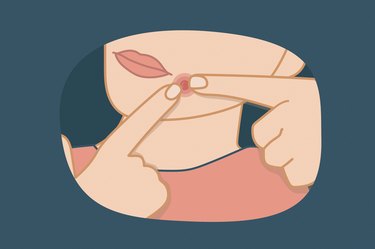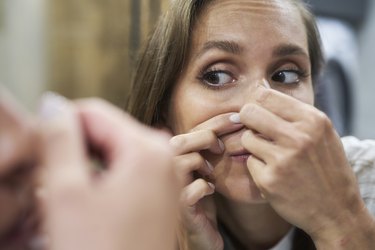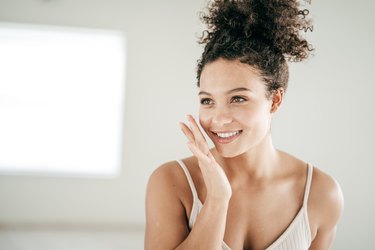
Although most acne cases afflict teens and young adults, pimples can persist long into adulthood. Hormones, stress, genetics, irritating products and medication can all contribute, regardless of your age.
If you have acne, you may be tempted to reach for one of the dozens of "natural remedies" to calm the problem rather than visit a doctor. Some do help, but be careful which ones you use to treat or cure your acne at home, as some can backfire, says Michele S. Green, MD, a dermatologist with Lenox Hill Hospital in New York City.
Video of the Day
Video of the Day
Here are the natural remedies that may clear your acne naturally, followed by the methods to stay away from.
1. Vitamin A
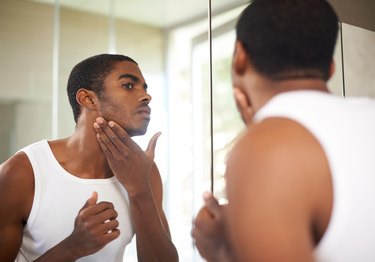
Vitamin A is the basis for the prescription medication Retin A, which has long been dermatologists' go-to topical treatment for acne.
Over-the-counter vitamin A creams (think: retinol creams) can also help minimize acne, albeit not as much as prescription forms, says Chris G. Adigun, MD, a board-certified dermatologist with the Dermatology & Laser Center of Chapel Hill.
"Vitamin A teaches your [skin cells] to turn over, helping treat and prevent clogged pores" Dr. Adigun explains.
Always apply this supplement at night, she cautions, as ultraviolet rays can decrease its effectiveness.
Try These Retinol Creams
- Drunk Elephant A-Passioni Retinol Cream: $28; Sephora.com
- Pond's Rejuveness Advanced Hydrating Night Cream: $7.99; Target.com
- The Inkey List Retinol Serum: $9.99; TheInkeyList.com
2. Aloe Vera
While aloe vera is widely known as a balm for rashes and burns, evidence suggests it can also calm acne, according to the National Center for Complementary and Integrative Health (NCCIH).
"Aloe vera has antibacterial properties that have been shown to work against inflammatory (red) and comedonal (whiteheads and blackheads) acne, and is soothing to irritated skin," Shoshana Marmon, MD, PhD, assistant professor of dermatology at New York Medical College, tells LIVESTRONG.com.
A review paper in the July-December 2015 issue of Pharmacognosy Review concluded that gel and cream preparations showed the biggest antibacterial effect against certain types of bacteria that can contribute to acne. And an April 2014 trial in the Journal of Dermatological Treatment found that adding aloe vera could also increase the effects of Retin-A.
Products containing aloe vera are generally safe as long as they're only used on your skin, not eaten. For this reason, be very careful when applying aloe vera to acne around the mouth and eyes.
The NCCIH recommends using aloe for acne twice a day to help improve milder cases.
3. Tea Tree Oil
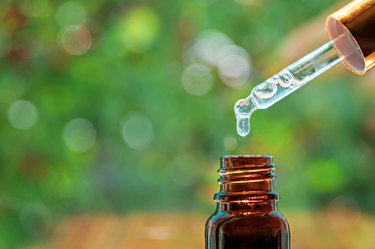
Like aloe vera, tea tree oil has strong antimicrobial and anti-inflammatory properties, Dr. Marmon says.
A few studies show limited evidence for tea tree oil for acne. This includes two 2015 review papers — one in the International Journal of Antimicrobial Agents suggesting some effectiveness and the other in the Cochrane Database of Systematic Reviews pointing only to "low-quality evidence" for efficacy.
A small March 2016 study in the Australasian Journal of Dermatology looked at 18 patients with mild to moderate acne and reported a decrease in acne lesions with temporary side effects of dryness and scaling. Participants in that study applied a tea tree oil gel with a face wash twice a day for 12 weeks.
As with aloe vera, tea tree oil is safe as long as it's not ingested.
4. Honey
Honey, especially raw honey like Manuka, is a natural antibiotic, making it a particularly easy home remedy for acne when applied to the skin. "It's handy because it lasts for so long," says Dr. Adigun. "You can put it in the cabinet."
The drawback? "It's such a mess," says Dr. Adigun.
An April 2017 study in Scientia Pharmaceutica indicates that honey in combination with cinnamon bark is able to kill off two types of bacteria that cause acne. The authors didn't note how often the mixture should be used, though.
Honey is also widely used as a dressing for wounds and burns as well as to treat psoriasis and dandruff.
5. Bee Venom
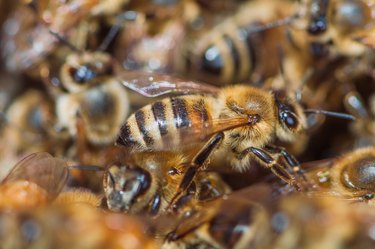
On the opposite end of the sweet spectrum is purified bee venom, which is found in some cosmetics. In research — including a September 2013 paper in the Journal of Integrative Medicine — it has shown some promise for acne.
In one May 2016 study in the Journal of Cosmetic Dermatology, three-quarters of 30 participants who slathered a serum containing bee venom over their entire faces twice a day for six weeks showed visible improvement in their pimples. All participants also washed their faces with a foam cleanser after applying the bee-venom product.
Like honey, bee venom fights bacteria. Unlike honey, you can't buy it in the grocery store; instead, you need to look for it in other products.
Warning
Some people may be allergic to insect venom and could experience serious or even life-threatening reactions when exposed to these products. Avoid these products if you have a known allergy to bee stings or other insects. And, to be on the safe side, anyone trying these products for the first time should apply a "test dose" to a very small area of skin and wait several hours to see if a reaction occurs.
Try These Bee Venom Products
- Miss Spa Bee Venom Facial Sheet Mask: $3.99; Target.com
- Rodial Bee Venom Cleansing Balm: $59; Amazon.com
6. Salicylic Acid
Another item often mentioned in the natural-remedies department is willow bark. It's not the raw tree bark, of course, that helps clear acne, but the salicylic acid it contains.
"It unclogs pores by dissolving oil on your skin," explains Dr. Adigun.
Salicylic acid is one of the most common ingredients in acne-fighting products like face was and spot treatments, and it's particularly useful for people with sensitive skin, Dr. Marmon says. It fights inflammation, bacteria and sebum, an oily residue from your sebaceous glands that can clog pores.
Good to know: In addition to being naturally sourced, salicylic acid can also be produced in a lab and is the active ingredient in aspirin, adds Dr. Adigun.
7. Baking Soda
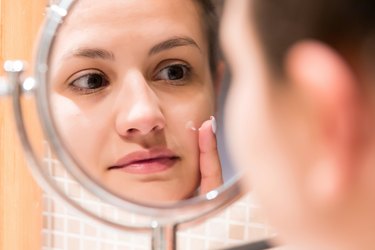
Baking soda, another staple of most kitchen cabinets, may also have a role to play in curbing acne.
Like many other natural remedies, baking soda is a natural antibiotic.
It can also be used as a scrub, but that runs the risk of irritating your skin. "The last thing you want to do with really bad acne is scrub, because it can cause acne. You want it to be as nonabrasive as possible," explains Dr. Adigun. Plus: "Because it's a totally different pH [acidity level] than your skin, it can cause dry skin."
If you want to use baking soda, mix it with water to form a paste and put it directly on the pimple, she says. "I don't recommend it to be used all over the face."
8. Green Tea
The polyphenols in green tea have both antimicrobial and anti-inflammatory properties, making green tea another potential natural remedy for acne. These qualities may help it control sebum production when used topically (i.e. applied to the face rather than ingested).
Several studies have looked at green tea polyphenols for acne and found some evidence to support its daily use. Most of the studies were small and not very robust, according to a March 2017 review in Antioxidants. This included one "split-face" clinical trial that reported reduced sebum, inflammation and acne when a tea lotion was applied twice daily, says Dr. Marmom.
"It's also well tolerated by patients," she adds.
What About Zinc?
Found in many cough-and-cold products, several randomized controlled trials have looked at oral zinc supplements to treat acne in adolescents and adults. The results have been mixed, according to the NCCID.
We do need the nutrient — in controlled amounts — for immune function, including wound healing. But bear in mind that too much zinc can be dangerous. "It's important not to exceed the recommended daily dose," Dr. Marmon says.
The National Institutes of Health Office of Dietary Supplements recommends getting between 8 and 11 milligrams per day.
In addition to supplements, zinc is found in oysters and other seafood, meat, beans, nuts, dairy products, whole grains and fortified breakfast cereals.
What About Witch Hazel?
Derived from the witch hazel shrub, topical witch hazel products contain tannins that can kill bacteria, says Dr. Marmon. Tannins are astringents or drying compounds, which would tame acne by cutting back on oily residue.
There's better evidence, however, to suggest that witch hazel can help treat cold sores, eczema and hemorrhoids, according to Kaiser Permanente.
What About Apple Cider Vinegar?
The citric acid in apple cider vinegar has been shown to kill Propionibacterium acnes, one of the bacteria which causes acne, says Dr. Marmon.
But the vinegar, while convenient, may actually do more harm than good, says Dr. Adigun. "It's so irritating without a lot of efficacy," she says. "I would try other agents first."
If you do try apple cider vinegar for acne, make sure you dilute it, say one part vinegar to three parts water, advises Dr. Green.
What About Lemon or Orange?
Although citrus fruits are often touted as a natural treatment for acne, putting lemon or orange juice or peel on your skin is only likely to make things worse, even though it contains bacteria-killing citric acid.
"It's going to burn and be irritating, so I'm less likely to recommend it," says Dr. Adigun.
It also makes your skin sensitive to light, says Dr. Green. Best to stay away from this one.
- American Academy of Dermatology: “Adult Acne”
- Acne Support UK: “Vitamin A”
- American Academy of Dermatology: “Retinoid or Retinol?”
- National Center for Complementary and Integrative Health: “Aloe Vera”
- Pharmacognosy Review: “Aloe vera: Potential Candidate in Health Management Via Modulation of Biological Activities”
- Journal of Dermatological Treatment: “Effect of Aloe vera topical gel combined with tretinoin in treatment of mild and moderate acne vulgaris: a randomized, double-blind, prospective trial
- Mayo Clinic: “Aloe”
- National Center for Complementary and Integrative Health: “Skin Conditions and Complementary Health Approaches: What the Science Says”
- International Journal of Antimicrobial Agents: “Treatment of acne with tea tree oil (melaleuca) products: A review of efficacy, tolerability and potential modes of action”
- Cochrane Database of Systematic Reviews: “Complementary therapies for acne vulgaris”
- Australasian Journal of Dermatology: “Tea tree oil gel for mild to moderate acne; a 12 week uncontrolled, open-label phase II pilot study”
- Central Asian Journal of Global Health: “Honey: A Therapeutic Agent for Disorders of the Skin”
- Journal of Cosmetic Dermatology: “Honey in dermatology and skin care: a review”
- Scientia Pharmaceutica: “Antibacterial Activity of Ethanolic Extract of Cinnamon Bark, Honey, and Their Combination Effects against Acne-Causing Bacteria”
- Journal of Integrative Medicine: ”Effects of cosmetics containing purified honeybee (Apis mellifera L.) venom on acne vulgaris”
- Journal of Cosmetic Dermatology: “Evaluation of anti-acne property of purified bee venom serum in humans”
- Dermnet NZ: “What is sebum?”
- StatPearls: “Salicylic Acid (Aspirin)”
- Antioxidants: “Green Tea and Other Tea Polyphenols: Effects on Sebum Production and Acne Vulgaris”
- U.S. Forest Service: “Tannins”
- Kaiser Permanente: “Witch Hazel”
- National Institutes of Health Office of Dietary Supplements: “Zinc”
Is this an emergency? If you are experiencing serious medical symptoms, please see the National Library of Medicine’s list of signs you need emergency medical attention or call 911.
